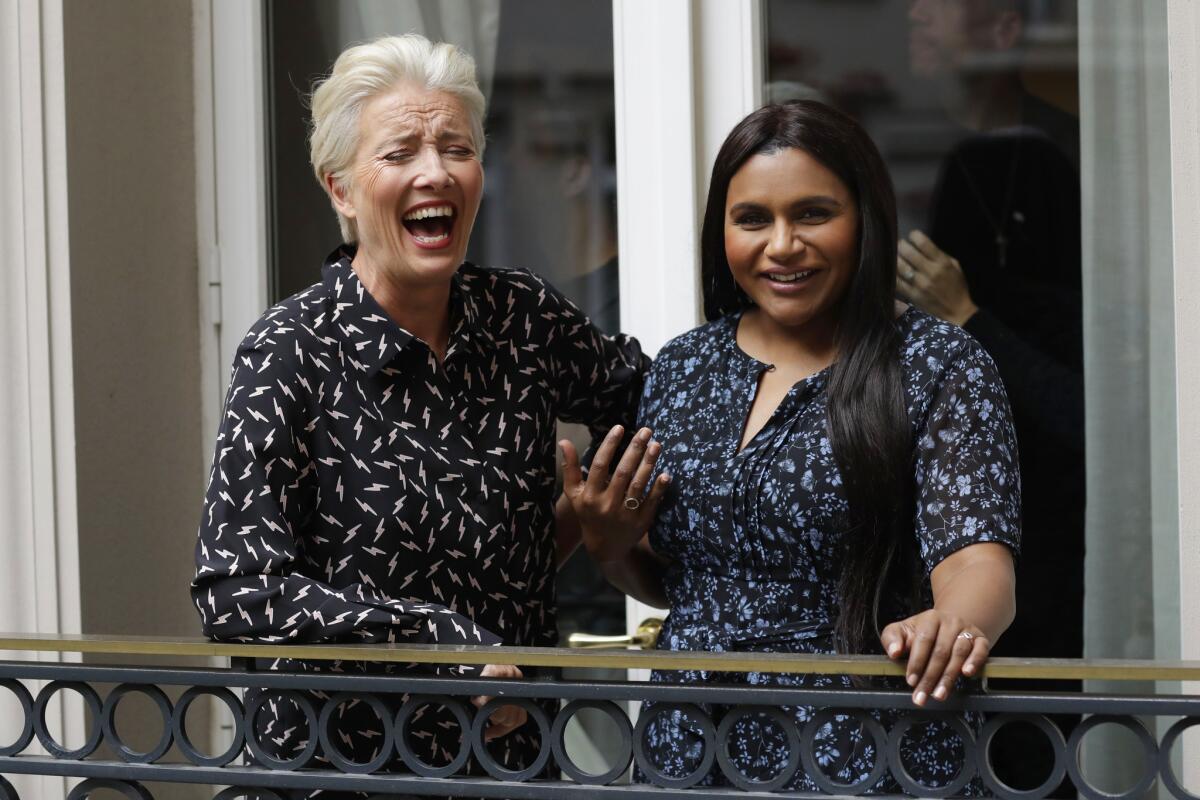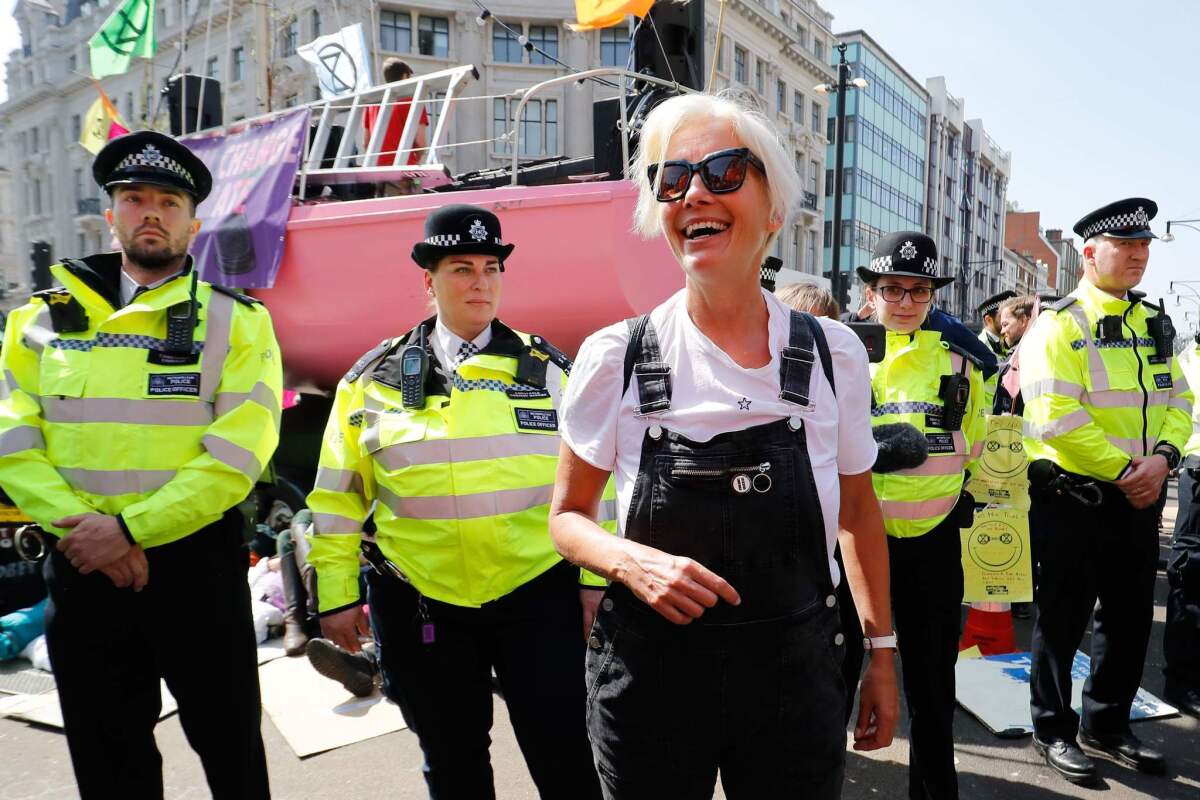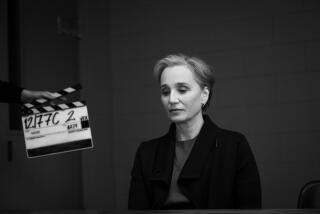Column: Emma Thompson left comedy after being called a ‘man hater.’ But she never stopped making trouble
If you want to understand why the number of female directors, cinematographers, studio heads and screenwriters remains so maddeningly low, all you have to do is ask the only woman — and the only person — who has won Oscars for acting and screenwriting.
Men, says Emma Thompson, have a huge motorway to power, with lots of lanes in it, which makes it very easy for them to aid other men along the same path.
“Women, on the other hand, have a kind of rutted track, on which there are many boulders. You can’t even get a bicycle down it; you have to get off the bike and lift it over things.”
Before we get into all of that, however, an admission: After more than a decade spent interviewing famous people, my usual response to any friend who expresses envy that I’ve interviewed [fill in the blank] is, “Yeah, it was cool, but it’s not like I’m invited over for Christmas dinner.” But if I’m being honest, I have secretly always wanted Emma Thompson to invite me over for Christmas dinner.
She did recently invite me for tea, however, and that’s something.
“My husband is in the kitchen with next to nothing on,” she says, greeting me at the door of a big, crazy Mulholland-adjacent house she and her husband Greg Wise found on Airbnb, “and Hannah’s here as well.”
Wise is, in fact, wearing swim trunks and “Hannah” is comedian Hannah Gadsby, whom Thompson famously befriended after one of Gadsby’s shows in Edinburgh. As Gadsby has told it, she had no idea who Thompson was until she Googled her.
Now she appears to be staying at Thompson’s rental. Because, you know, Emma Thompson is the bomb, and that’s all there is to that.
After becoming a presence on stage and British TV, Thompson slid into American consciousness almost 30 years ago with the amnesia thriller “Dead Again,” in which she co-starred with her then-husband Kenneth Branagh, and quickly became an awards-season fixture (“Howards End,” “The Remains of the Day,” “In the Name of the Father,” “Sense and Sensibility,” “Angels in America”).
In those early years, she was part of a power couple — “Ken and Em” — and a power crowd that toggled easily between Shakespeare (Branagh, Derek Jacobi, Anthony Hopkins) and modern comedy (Hugh Laurie, Stephen Fry). She is still part of a power couple, now married to Wise (“The Crown”), and that power crowd has only grown to include all manner of younger people, including Mindy Kaling, who wrote the movie “Late Night” just for Thompson.

REVIEW: Mindy Kaling and Emma Thompson make ‘Late Night’ a great night »
The toggling also continues — she recently starred in Amazon’s “King Lear” with Hopkins, and this month, in addition to “Late Night,” she reprises Agent O for “Men in Black: International” (which, for the first time in the franchise’s history, features a female lead) and plays a populist Trump-like politician in Russell T. Davies’ upcoming HBO series “Years and Years.”
Yet Thompson has always been very much her own self — outspoken, political, continually present in public conversations about a wide range of topics including urban development, public education, the environment, equal pay (for it), Brexit (against it) and climate change. She has been known to tell female costars to not lose weight, and threatened to quit a production (“Brideshead Revisited”) if pressure were put on an actress to do so.
Earlier this year, she began her own #MeToo boycott. When Skydance hired John Lasseter, who had left Disney after multiple allegations of sexual harassment were made against him, Thompson pulled out of a Skydance animated film. Then she made the stinging letter in which she explained her decision available to The Times.
Not surprisingly, Thompson is often criticized in a way very few American actors who are not Jane Fonda have ever been. In Britain, she is often referred to as a “luvvy,” a derogatory term used to describe an actor who talks about issues other than acting (it is often preceded by the word “leftist”). Throughout her career she has been trashed in portions of the British press, most recently for flying first class from L.A., where she was working, to London, where she lives, because she then participated in an Extinction Rebellion demonstration.
Her response? She regrets that she wasn’t there in time to be arrested on her 60th birthday.
“I get in trouble all the time,” she says, just a few days before the demonstration and that birthday. “If you don’t want to get in trouble you’re never going to get anything done or changed.

“I know people will say, it’s OK for me — I’m established, I’m successful and I’m old. But I’ve been getting in trouble since I was young. So you can get to where you want to go and be in trouble the whole way through. If nothing else, I am proof of that.”
Like I said, the bomb.
Thompson, who looks just like she always does except she’s in shorts, apologizes for not having “real” tea, motions to the enormous professional stove and announces: “Look at this thing and there was nothing to cook with when we got here. Greg had to go out and buy pots and pans.”
It is very much a catered-entertainment house, with three enormous public rooms on the first floor and a lot of big art clearly chosen to match the color palette. Not quite what Thompson and Wise had expected, but they’d been working apart for six months, she says, and when she came to L.A. for “Late Night,” she decided they needed a long visit. And “the backyard is lovely.”
We chat briefly about Meghan Markle — Thompson doesn’t think much of the royal family but “everyone’s making an effort, and she looks like a nice bird” — before getting down to business. Which in Thompson’s case, means a conversation about her recent projects, yes, but also about global warming, sexual harassment, the power of youth in an age of existential despair and the radical politics of napping.
And of course, the gauntlet she threw down over Lasseter.
The decision to pull out of the Skydance film was, Thompson says, the only option because “I can’t speak up about women’s rights and then not do it. The same way you can’t say ‘skinniness doesn’t matter, we shouldn’t do that’ and then kill yourself to be tiny for movies. It doesn’t work.”
ALSO: Emma Thompson’s letter to Skydance: Why I can’t work for John Lasseter »
Although Skydance has made no response to her letter — “presumably because there are no sensible answers to those questions” — she has heard from many other people, including Brenda Chapman, who was fired as director of the Pixar film “Brave,” for which Thompson voiced the main character’s mother.
“It reminded me that she had had a difficult time there; I didn’t know exactly why because she had been very discreet about it. She was fired and when that happened I asked her if she wanted me to walk. She said she didn’t because she just wanted the film to be made. But we were much further along in the process.”
In this case, Thompson’s politics play right into her next big project. In “Late Night,” she stars as a late-night host whose show has gone stale in part because its writers room is, as it’s ever been, filled with white men.
Thompson’s first reaction to discovering Kaling wrote the part with Thompson in mind was anxiety: “If you’ve written something for someone it’s often a mistake.” That feeling was quickly assuaged by the actual script. “I just thought it was wonderful,” Thompson says. “A lot of politics without being pious or obvious.”
It was also a comedy, and that, Thompson says, is what she wants to be doing in the future.
“We’re all suffering from existential despair at the moment; I am certainly. So I feel now that that’s where I should put my best efforts — into making things that are funny, things that might have serious intent but funny.”
It is where she started, after all. At Cambridge, Thompson was a member of the Footlights Dramatic Club. After college she did solo shows (in “Late Night,” the video of her character Katherine’s old stand-up is actually that of Thompson in 1983) and then joined Fry and Laurie on their comedy shows, “The Crystal Cube” and “Alfresco.”
In 1988, she launched her own series called “Thompson.” And that was the end of her career in comedy, at least for a while.
“‘Thompson’ was ripped apart by critics,” she says. “They said it was ‘man-hating.’ You can’t imagine how terrible they were, so destructive and deeply, inutterably misogynistic. I absolutely know that now but I didn’t then. At the time, I couldn’t get out of bed. I thought, ‘All right, maybe I shouldn’t be doing this.’
“So I got into serious acting,” she says, adding with a completely straight face: “I’m quite good at serious acting.”
Thompson is not a woman who is afraid to show anger. During a wide-ranging conversation, her voice rises when she talks about the complaint that increased attention to sexual harassment has left men unsure of how to behave: “Get a grip guys, it’s not rocket science. You just behave with respect and courtesy. Now shut up and get on with it. And please don’t make this your … problem. I’m so fed up with that I just want to smack them.”
She’s also had it with arguments about pay equity: “I’ve had people say, ‘Well, it’s more complicated than that.’ No it’s not. It’s work that has to be done, and you pay someone to do it and you don’t pay them less because she’s a woman.”
And don’t get her started about fracking.
But the notion that her comedy career was derailed by male critics doesn’t appear to bother her.
“I think my response was a sensible one,” she says. “I had to support myself. I had to earn money. I really mean that,” adding, “especially as a woman. You must be able to earn your own living. You cannot be dependent upon someone else’s wage. Money is so important to young women.”
Thompson feels very strongly about young women, about how she can help young women, generally and specifically, off-set and on.
“Wherever you are, there’s always something you can be doing different and it’s usually about communication with the people on the ground. You have to talk to the people who are not paid very much and find out what is going on with them.”
After she finished “Last Christmas,” a film she co-wrote and stars in, along with “Game of Thrones’” Emilia Clarke and “Crazy Rich Asians’” Henry Golding, she asked some of the younger women who had worked on the film to have a chat about their experience.
“They identified all sorts of things, “ she says. “Such as it’s quite difficult to say that someone is being inappropriate or difficult if that person costs much more to replace than you. If you’re a runner, a little lass on the set, you can be replaced in two minutes. So if you’re being bullied or got at by a member of the higher-status community it’s very hard to say anything.”
To help make women feel safer, Thompson plans to have this sort of meeting before her next movie begins shooting, to arm young women in advance, to let them know they have someone they can talk to. “Bullies and predators are very clever about when they try to intimidate and abuse. They don’t do it when there’s someone right next to them who’s going to say, ‘What … do you think you’re doing?’”
The problem, she says, is that there are still too few women in power (see above) and that those who are often lack the time or energy to mentor younger women.
“If you get finally to the place at the end of that rutted track, it’s very hard to go back down and say, ‘By the way, that’s a dead end here and there’s a boulder there.’ That takes time and women don’t have a lot of that.”
There’s also a confidence issue; Thompson says she has always been quite confident, but she knows many women who aren’t and for no good reason.
“Men will say they can do things they can’t and the women will say they can’t do things that they can do. They will be offered a job that they are absolutely perfect for and they’ll say, ‘Oh, I can’t do that’ and some bloke who can’t do it will stand up and say, ‘I’ll do it, it’ll be great.’”
She isn’t quite sure why she has never been afraid to say what she is thinking, including, when she was a young comedian, “get your hands off me.”
“I guess I just don’t care,” she says. “I’ve been trashed in the press, my career was absolutely changed by the response of those misogynistic critics. But I just don’t care. It’s not to say that it wasn’t painful, but I knew I couldn’t work properly in a false environment because nothing would be any good at all. It’s exhausting.”
Maybe. Yet for a woman who claims at least three times in an hour to be in the midst of an existential crisis, Thompson clearly has a lot of energy — in addition to “Late Night,” “Men in Black,” “Years and Years,” and “Last Christmas,” she has been working on a stage version of “Nanny McPhee,” and oh, yeah, it’s a musical.
“Musicals are hard,” she admits.
More important, she is galvanized by climate change.
“Everything is changed by the horrific cataclysm that is happening as we speak — the sixth extinction. Because no one has said the thing coming over the wall is us,” she says. “We have to recognize our part and change; it’s so hard to change. We are in charge of all this.”
More to Read
The biggest entertainment stories
Get our big stories about Hollywood, film, television, music, arts, culture and more right in your inbox as soon as they publish.
You may occasionally receive promotional content from the Los Angeles Times.











